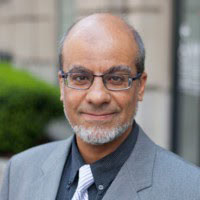
Interacting and engaging with peers and colleagues from other faiths has opened my eyes to a few issues. I realized that prejudice and bias exist not only towards Muslims, but also other groups. In many situations it manifests its ugly face as an outcome of unintentional ignorance and cultural baggage, influenced by media and societal stereotypes, and less commonly by evil agendas.
I also recognized that many leaders from all three faiths recognize and understand the economic values and principles of their faiths, and believe that they bring positive impact to society. However, as leaders in society we collectively fail to voice our opinions in everyday business discussions and non-faith settings. We have all accepted that discussing faith in the workplace and in public settings is not seen as appropriate or politically correct. Basing professional opinions on faith-based principles has become considered by society as unscientific, inappropriate, and irrelevant.
Joining the discussions and work sessions with participants of the Justice Leaders Fellowship allows one to be more courageous and bold in referencing the scriptures and divine revelation by the Creator of the Heavens and the Earth, without hesitation. Divine revelation has been brought down to mankind as mercy and compassion to guide human beings to the ideal and optimum lifestyle a person and global society can experience.
As humans dismiss the economic and social justice principles sent by the Creator, and attempt to substitute man-made replacements, we continue to experience new problems. These new problems force us to attempt to mend them, introducing more man-made imperfections. Take as an example the U.S. tax code and compare it to the Islamic system of Zakat, obligatory giving that is one of the five pillars of Islam, or the Jewish tzedakah, charitable giving that is rooted in social justice. The tax code is much less effective, less fair, and miniscule in impact compared to the divine solutions.
As leaders of non-profit organizations we are in a unique position where, with confidence, we can propose solutions to the crises we have in our society, backed by scripture, and the teachings and lifestyles of the prophets and messengers.
As a society we have confined the impact and value of faith to the four walls of our institutions and hearts of our congregations. Leaders who believe in a faith must not shy from sharing their perspectives about solving problems in society based on divine solutions outlined to mankind in scripture. It is the obligation of every leader to share the divine economic solutions presented in the scriptures to promote social justice and fairness.
It is practically not possible for a society to separate faith from state while expecting to produce perfect systems that provide social justice based on principles originating from divine revelation. At some point a collision will occur between the principle and the implementation, leading to a defective solution. For example, implementing interest rates on lending money will automatically lead to inflation and a poorer older generation by definition. This implementation conflicts with a social justice principle in all three faiths—honoring elders and appreciating them when they have completed their mission to society and are unable to earn a living.
As a Systems Engineer and Architect, I understand that systems behave based on their structures, and not the environment. The environment can cause changes to the structure, which would then affect how the system behaves. If we want to change behavior and foster/encourage/promote social and economic justice in Baltimore, we must change the structure of social and economic systems. Attempting to change the environment without correcting the structure will not yield the desired results, and will only lead to diluted impact, or delayed root cause mitigation.
So, what is the structure? It is the underlying architecture that supports wealth generation, distribution, and flow, built on sound principles, and embodied in a way that implements the principles without contradicting them. What is the environment? The policies and trends in society that could strengthen or erode the structure.
We can choose to ignore the absolute truth as revealed in the scripture and spend our lives going in circles attempting to discover a solution to a problem that already has a solution revealed thousands of years ago. Or we can choose to pause, learn, discover, and innovate. The ICJS Justice Leaders Fellowship is taking the first steps toward the latter, bringing back the divine revelation into our practical everyday lives as leaders for a more pragmatic and pluralistic outcome.
 Ayman Nassar is Founder and Chief Student Experience Officer at the Islamic Leadership Institute of America (ILIA), and a member of the 2021 ICJS Justice Leaders Fellowship.
Ayman Nassar is Founder and Chief Student Experience Officer at the Islamic Leadership Institute of America (ILIA), and a member of the 2021 ICJS Justice Leaders Fellowship.
Baltimore is part of a national conversation around questions of justice, race, and community. Members of the ICJS Justice Leaders Fellowship consider how Jewish, Christian, and Muslim teachings and practice can contribute to the public conversation about (in)justice. Opinions expressed in this blog are solely the author’s. ICJS welcomes a diversity of opinions and perspectives. We do not seek a single definition of justice between or within traditions.